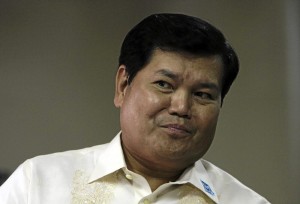Personnel of the Anti-Money Laundering Council (Amlac) may have leaked photocopies of the signature cards of Chief Justice Renato Corona initially kept in a branch of Philippine Savings Bank in Quezon City.
This possibility surfaced on the 20th day of Corona’s trial at the Senate impeachment court.
Senate President Juan Ponce Enrile on Monday noted that apart from authorized PSBank officials and personnel, only representatives of Amlac and Bangko Sentral ng Pilipinas (BSP) were able to scrutinize Corona’s signature cards up close.
PSBank president Pascual Garcia III said Amlac had even asked for photocopies of Corona’s signature cards taken from the Katipunan branch during an audit.
Garcia recalled that from September to November 2010, a combined team of BSP and Amlac representatives conducted a bank-wide audit of PSBank records.
Garcia noted that while the BSP regularly conducted audits “for loans and other processes,” it was the Amlac that asked specifically for Corona’s signature card from the Katipunan branch.
Garcia told Enrile during his lengthy grilling that it was “normal” for Amlac to join the BSP in bank audits.
The PSBank president said the bank remained “in control” of the records of a public official at the time it was examined by Amlac.
Garcia noted “significant differences” between Corona’s original specimen signature cards and copies earlier submitted by the House prosecution panel to the impeachment court.
The PSBank president said he and fellow bank officers listed a total of 42 “points of difference,” which he later submitted to the impeachment court.
Most striking of these differences were the three signatures of Corona, which, in the original document, “are written with a fluid stroke indicating spontaneous and natural execution and they are likewise thicker indicating use of a sign pen,” Garcia said.
Photocopying of records
Initially, Garcia said he was “not certain” whether Amlac representatives were allowed to photocopy bank records.
But during questioning by Senator Ferdinand Marcos Jr., Garcia said the photocopying of documents by Amlac was “oftentimes necessary.”
Asked more specifically by Marcos whether Amlac representatives had made photocopies of “deposit samples during their 2010 audit,” Garcia said “we provided them as required.”
Politically exposed
Garcia could not name the specific Amlac agents involved in the inspection but noted that the bank was later advised to put the notation “PEP” for “politically exposed person” in Corona’s records.
Under Amlac rules, elected and appointed public officials are considered PEP and should be classified in bank records as such, according to Garcia.
He failed to recall the specific date when Amlac asked for Corona’s signature cards.
However, he said Amlac “actually looked at few accounts classified as ‘need to be reported’ and I believe that one of these was an account from Katipunan (branch).”
Amlac is tasked with ensuring that banks adopt “processes” it requires such as reporting transactions that involve at least P500,000 and classifying public officials as PEP in bank records, Garcia said.
Garcia recalled that Amlac did not file any adverse report about PSBank based on the audit at the time.
Access to records
During a lull in the proceedings, Enrile volunteered that his questions to Garcia stemmed from his observation that apart from authorized PSBank officials and employees, it appeared that BSP and Amlac representatives were among those who had access to Corona’s records.
“So people would not misunderstand the questions of this chair, there are many people who handled records of the Chief Justice. The people in the Katipunan branch, the president of the bank in the central office, none other could possibly have brought out those documents like the one attached to supplemental request for a subpoena submitted by the prosecution,” Enrile told the court.
“The only thing that is not scrutinized is the document coming from records in the Katipunan branch that was submitted to the Amlac and BSP team that conducted an audit between September and November 2010,” he added.
The Katipunan branch manager, Annabelle Tiongson, earlier asserted that the photocopy of Corona’s signature cards presented in court by the prosecution via its subpoena request “seems fake.”
Enrile then ordered Garcia to produce the signature card that Amlac representatives had photocopied so that the specimen signature could be compared with those in the photocopies reportedly given to Mindoro Rep. Reynaldo Umali by a “small lady.”
Senator Teofisto Guingona III later stood up and confronted Garcia about the presence of Amlac representatives during the 2010 audit.
“Are you sure it was Amlac that audited you? I wish you would verify this first before you answer, if you can recall people who actually faced those people who audited your bank,” he said.
Court order
Guingona reminded Garcia that Amlac representatives would only visit a bank “upon a court order or the existence of a predicate crime.”
In an insistent tone, Guingona told Garcia that only the BSP was authorized to routinely audit banks to ensure that they comply with laws against money laundering.
“Is it possible that what happened was just a regular BSP audit and it so happened there was an Amlac specialist to make sure that laws are being complied with. It is not routine for Amlac to audit banks. I called Amlac during the break and they categorically denied they did audit you,” he added, provoking hisses from the gallery.
Unperturbed, Guingona went on to remind Garcia that the PSBank audit by the BSP and Amlac “happened before the impeachment.”
Senator Joker Arroyo raised his hand saying he was “elated” that Garcia mentioned the BSP-Amlac audit.
Arroyo warned fellow senators that a Senate bill amending Amlac provisions allowing the council to scrutinize a depositor’s bank records without prior notice would relax banking rules and give the council more powers.
Arroyo warned that relaxing Amlac rules could pave the way for the council’s use for political vendetta and that senators like them could eventually be targets. With a report from Michael Lim Ubac
